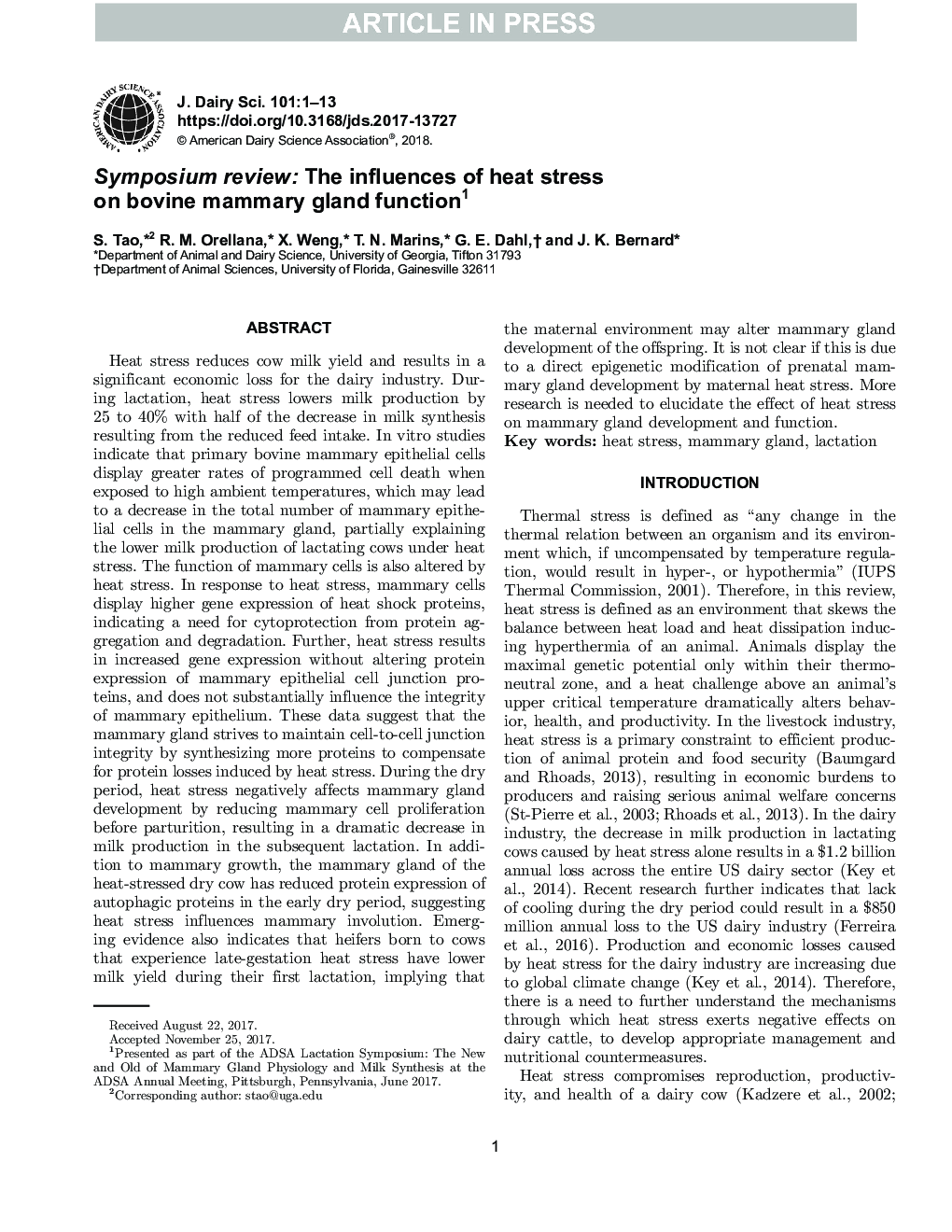| کد مقاله | کد نشریه | سال انتشار | مقاله انگلیسی | نسخه تمام متن |
|---|---|---|---|---|
| 8501231 | 1553839 | 2018 | 13 صفحه PDF | دانلود رایگان |
عنوان انگلیسی مقاله ISI
Symposium review: The influences of heat stress on bovine mammary gland function1
ترجمه فارسی عنوان
بررسی سمپوزیوم: تأثیر تنش گرمائی بر عملکرد ژن شیری گاو 1
دانلود مقاله + سفارش ترجمه
دانلود مقاله ISI انگلیسی
رایگان برای ایرانیان
کلمات کلیدی
استرس گرما، غده پستانی، شیردهی،
موضوعات مرتبط
علوم زیستی و بیوفناوری
علوم کشاورزی و بیولوژیک
علوم دامی و جانورشناسی
چکیده انگلیسی
Heat stress reduces cow milk yield and results in a significant economic loss for the dairy industry. During lactation, heat stress lowers milk production by 25 to 40% with half of the decrease in milk synthesis resulting from the reduced feed intake. In vitro studies indicate that primary bovine mammary epithelial cells display greater rates of programmed cell death when exposed to high ambient temperatures, which may lead to a decrease in the total number of mammary epithelial cells in the mammary gland, partially explaining the lower milk production of lactating cows under heat stress. The function of mammary cells is also altered by heat stress. In response to heat stress, mammary cells display higher gene expression of heat shock proteins, indicating a need for cytoprotection from protein aggregation and degradation. Further, heat stress results in increased gene expression without altering protein expression of mammary epithelial cell junction proteins, and does not substantially influence the integrity of mammary epithelium. These data suggest that the mammary gland strives to maintain cell-to-cell junction integrity by synthesizing more proteins to compensate for protein losses induced by heat stress. During the dry period, heat stress negatively affects mammary gland development by reducing mammary cell proliferation before parturition, resulting in a dramatic decrease in milk production in the subsequent lactation. In addition to mammary growth, the mammary gland of the heat-stressed dry cow has reduced protein expression of autophagic proteins in the early dry period, suggesting heat stress influences mammary involution. Emerging evidence also indicates that heifers born to cows that experience late-gestation heat stress have lower milk yield during their first lactation, implying that the maternal environment may alter mammary gland development of the offspring. It is not clear if this is due to a direct epigenetic modification of prenatal mammary gland development by maternal heat stress. More research is needed to elucidate the effect of heat stress on mammary gland development and function.
ناشر
Database: Elsevier - ScienceDirect (ساینس دایرکت)
Journal: Journal of Dairy Science - Volume 101, Issue 6, June 2018, Pages 5642-5654
Journal: Journal of Dairy Science - Volume 101, Issue 6, June 2018, Pages 5642-5654
نویسندگان
S. Tao, R.M. Orellana, X. Weng, T.N. Marins, G.E. Dahl, J.K. Bernard,
